|
ACE OF
SPADES
Questions - What is power? What is your relation with it? The Excalibur myth, engraved in an anvil, simbolizing the unity of political wishes rooted to the Earth and to material necessities, corresponds to the central idea of this card. It should be the Marxists "super structure", a group of activities that aims for the reproduction of the working conditions, or simply, power. As we saw, the Tem of Diamonds (multiplicity of material forms and the Ace of Spades (the reality’s mental unity) are equivalent cards, because a while the Tem of Diamonds sees everything that is related to society in a more decentralized and economic way, the Ace of Clubs observes the cohesion of the group through a more political angle. As a sword was to blades, the mind works the power that so much generates suffering like creative solutions for life. May times, however, the Ace of Spades imply in the emergency of a new concept or of a new mental power that, in the majority of the cases, generates conflicts. |
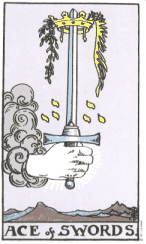 |
|
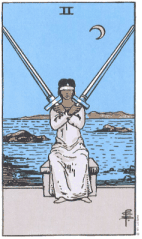 |
TWO OF
SPADES
Question - For how long can you stand a situation against your will just not to get involved in a conflict? Give an example. Before opposite tense forces, tiere is a tacit denial in facing a situation of eminent conflict. Immanent contrary tendencies are silently developed: there is animosity between the archetypes of the Father and the Mother, ratio and emotion, public and private -- generating a stage of paralyses and tense inertia. |
|
THREE OF
SPADES
Question - When was the last time you fought with somebody? Here we have a violent action starting a conflict. The action, result of the arrival of a third element, unbalances the correlation of polarized forces producing the fight, pain and separation. However, there is also a certain relief and a feeling of freedom in this attitude that breaks the paralyzed immobility of the previous situation. |
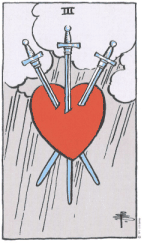 |
|
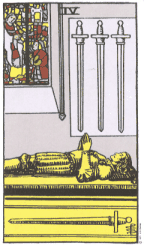 |
FOUR OF
SPADES
Question - What makes you feel excluded? And when do you feel a need to be recognized? How often in a month do you need to be alone? After a conflict, there is always a period of introversion, silence and recuperation, one can keep force to face new challenges. Isolation and reflection are necessary for one to emotionally recuperate from the conflict. |
|
FIVE OF
SPADES
Question - What's the biggest mission of your life? And what was your biggest failure or defeat? To accept one's own destiny as a "mission" -- like a plan with objectives to be realizes -- implies in the necessity to face one's own limitations and recognize that life must be lived within our capacity frontiers. However, this conscience brings more responsibilities that we can take. Therefore, we never feel capable of "living our task". Because of this, this card was associated to defeat by Waite and Crowley. But, determination is not only a result of an obstinate and stubborn temperament, it is also a result of humility. |
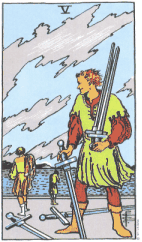 |
|
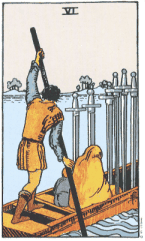 |
SIX OF
SPADES
Question - What do you consider to be unforgivable or refuse to understand? Waite illustrates this card with the image of a sailor taking the souls down the river of the spirit. When we travel, our mind experiences a mixture of serenity and attention before the diverse sceneries that follow. The capacity of comprehension resides in the firmness and openness of the mind in understanding all the sequences of thoughts and images, principally those that aren't adverse to us. |
|
SEVEN OF
SPADES
Question - Do you use to hide your plans and projects? What kind of planning requires to be kept in secret? Here the mind plans and acts with intelligence and discretion: acts indirectly aiming a pre-determined objective, avoiding direct contacts to preserve one's own forces to the maximum. The card also holds a negative connotation of falsity, entrapment or treasonable vengeance. It is an immoral card. |
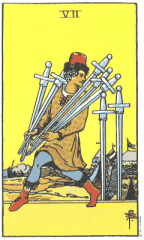 |
|
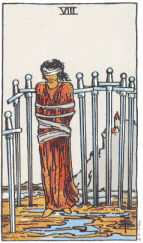 |
EIGHT OF
SPADES
Question - Knowing that you will be defeated, do you give yourself up or fight until the end? Give two examples, justifying your answer. We have a situation where one is unable to act for fearing the consequences. There is a paralyzing indecision. But, as opposed to the Two of Spades, where the mind wants to omit the latent conflict, the Eight of Spades reflects a more responsible and participating situation: it is necessary to decide and choose between both sides of yourself. Waite and Crowley emphasize the ideas of reduced force, restriction and imprisonment. |
|
NINE OF
SPADES
Question - What do you most fear in life? What is your biggest fear? Morbid fantasies in relation to the future, the sensation of a tragic end or a fatality, appear here with the power of true nightmares. Almost always these visions originate from remorse and guilt for past actions. The mind fears being punished by its mistakes and makes negative projections for the future. This anxious situation can lead one to despair. Waite emphasizes still the ideas of "illness and suffering" and Crowley, of "cruelty". |
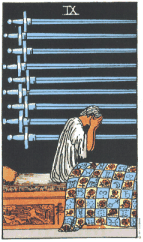 |
|
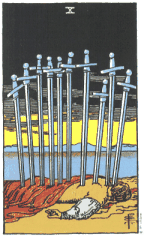 |
TEN OF
SPADES
Question - Prepare your will, including, besides all you assets, ideas, feelings, abilities, personal objects or anything you want to distribute among your friends and family after your death. For many, this is the most negative card of the tarot, meaning ruin, physical death and catastrophe. However, we can also see its a group of mental forms in harmony, like the redistribution of power in a battle. It is the "finished war"; justice done; a patrimony divided. This equilibrium of mental forces in its diversity and in the submission of the defested before the winners, corresponds to a determined type of superior unity, to an "emotional agreement". Because of this, we can affirm that the Tem of Spades corresponds to the Ace of Hearts in a more elevated level. |
|
|
|
|
|